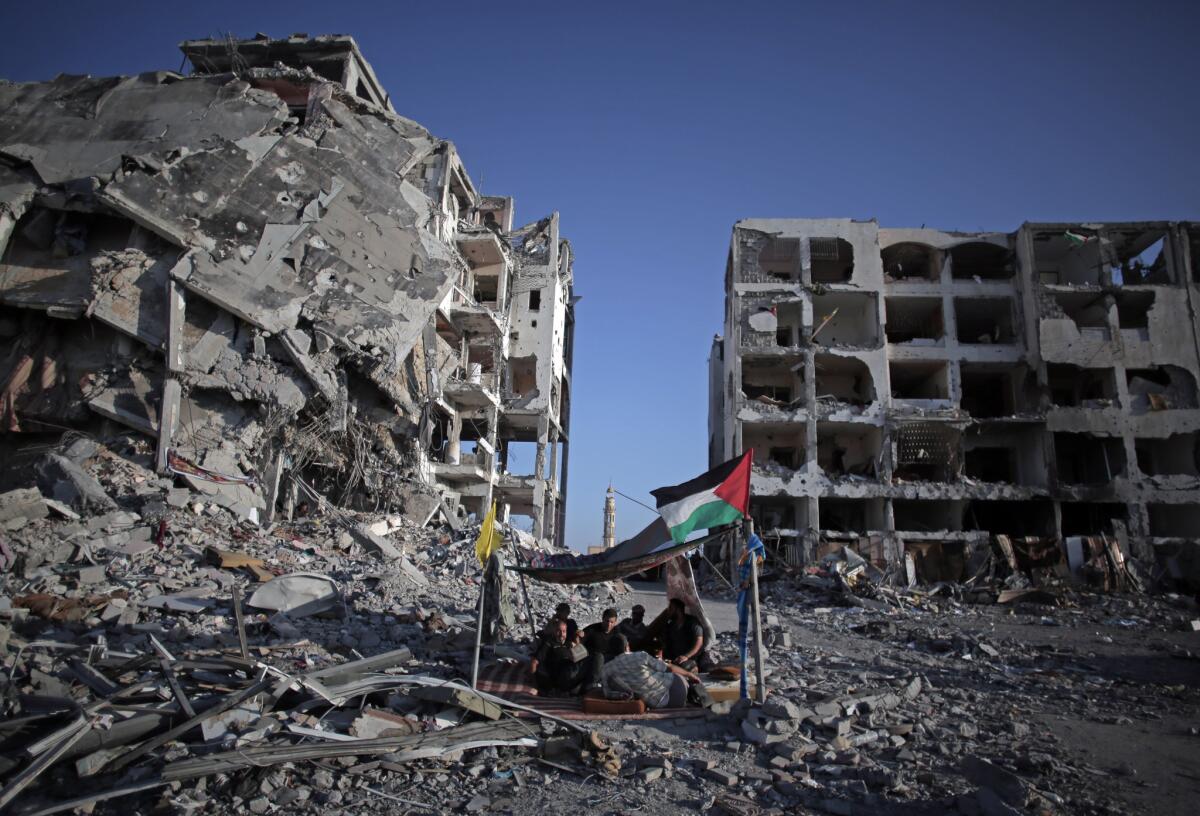Amnesty International condemns Israel for Gaza civilian deaths

- Share via
Reporting from Jerusalem — Israeli forces “brazenly flouted the laws of war” and showed “callous indifference to the carnage” caused by attacks on civilian targets during the recent conflict in the Gaza Strip, according to a report released by Amnesty International on Wednesday.
In some cases, Israeli airstrikes on inhabited Palestinian homes “amount to war crimes,” the report asserts.
Israeli officials quickly blasted the report as a “propaganda tool for Hamas,” the militant movement based in Gaza.
According to the United Nations, at least 2,192 Palestinians were killed during the 50-day conflict fought this summer. Among them were 1,523 civilians, one-third of them children.
Israel suffered 72 fatalities. Most were soldiers; the others were civilians killed as Hamas and other militants launched thousands of rockets into Israel.
Israel cited Palestinian rocket attacks, as well as cross-border tunnels dug by militants, as the principal reasons for its assault on the coastal enclave.
Fighting halted Aug. 26 when Egypt brokered an open-ended truce between Israel and military groups in Gaza. The truce remains in place, although fragile and sporadically violated, pending talks of a more lasting cease-fire and efforts to rebuild Gaza amid widespread devastation.
The report examines eight cases of Israeli airstrikes against inhabited civilian homes that killed at least 104 civilians, including entire families.
The cases include two strikes with particularly deadly results, the bombing of the al-Dali building that killed at least 33 civilians, and the destruction of the Abu Jame family home where 25 civilians died, including 19 children.
In these and two other cases, Amnesty says it was able to identify a possible military target in the buildings. However, the report stresses that even if a military objective was present or perceived, the attacks were “grossly disproportionate” to any possible military advantage and should have been called off the moment it was evident that so many civilians were present.
The presence of a military target does “not absolve Israel of its obligation to take every feasible precaution to protect the lives of civilians caught up in the fighting,” according to Philip Luther, director of the Middle East and North African Program at Amnesty International.
Israel’s “repeated, disproportionate attacks on homes” indicate its current military tactics are “deeply flawed and fundamentally at odds” with international humanitarian law, he said.
In all cases reviewed, Amnesty charges that Israel gave civilians no prior warning to allow them to escape and failed to comply with international humanitarian law obliging necessary precautions to avoid excessive harm to civilian life and property.
“It is tragic to think that these civilian deaths could have been prevented,” Luther said. “The onus is on Israel to explain why they chose to deliberately flatten entire homes full of civilians.”
During the fighting, Israel’s military frequently stressed measures it said were being taken to minimize harm to civilians, including dropping leaflets and placing phone calls and text messages warning of impending strikes. On several occasions, the army released footage documenting airstrikes aborted at the last minute to avoid civilian casualties.
Citing what it called the failure of both Israelis and Palestinians to investigate allegations of war crimes, Amnesty urged both to join the Rome Statute to grant the International Criminal Court jurisdiction to investigate their territories.
Israel flatly rejected the report, saying it shows “extreme bias.”
A statement from the foreign ministry charged that Amnesty International ignored “documented war crimes perpetrated by Hamas,” including firing rockets at Israeli civilians and using its own civilians as human shields.
Although the rights group said it continues to document violations of international humanitarian law “including unlawful killings … both by Israel and by Hamas,” Israel criticized it for avoiding the word “terror” in relation to Hamas and its actions, obscuring its nature and absolving it of responsibility.
“Amnesty’s report fails to contribute to the important discussion needed to solve the conflict,” the statement said. “Instead, Amnesty serves as a propaganda tool for Hamas and other terror groups.”
Israel also dismissed the group’s call for International Criminal Court’s jurisdiction, intended for countries whose judicial system cannot or will not investigate suspected crimes, among other conditions.
In September, Israel’s chief military prosecutor Maj. Gen. Dan Efroni ordered a criminal investigation in two cases of suspected violation of international law, while continuing to review dozens of others.
More than 90 incidents that took place during the Gaza war are under review by several bodies both inside and outside of Israel’s military, according to the foreign ministry.
Israel faulted Amnesty International for relying on unnamed field workers in compiling the report. According to the group, it was forced to conduct its research remotely as Israel denies it access to Gaza.
Sobelman is a special correspondent.
More to Read
Sign up for Essential California
The most important California stories and recommendations in your inbox every morning.
You may occasionally receive promotional content from the Los Angeles Times.













